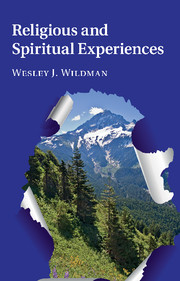Book contents
- Frontmatter
- Contents
- List of figures
- Preface
- Acknowledgements
- 1 Exploring a strange yet familiar landscape: a strategy for interpreting religious and spiritual experiences
- 2 Spirituality and the brain: a revolutionary scientific approach to religious and spiritual experiences
- 3 A smorgasbord of dangers and delights: the phenomenology of religious and spiritual experiences
- 4 Gateway to ultimacy: the importance of intense experiences
- 5 Can you trust your instincts? The cognitive reliability of religious and spiritual experiences
- 6 The brain-group nexus: the social power of religious and spiritual experiences
- 7 Make it start, make it stop! Religious and spiritual experiences in the future
- 8 Brains in bodies, persons in groups, and religion in nature: an integrative interpretation of religious and spiritual experiences
- Glossary of key terms
- References
- Index
3 - A smorgasbord of dangers and delights: the phenomenology of religious and spiritual experiences
Published online by Cambridge University Press: 04 February 2011
- Frontmatter
- Contents
- List of figures
- Preface
- Acknowledgements
- 1 Exploring a strange yet familiar landscape: a strategy for interpreting religious and spiritual experiences
- 2 Spirituality and the brain: a revolutionary scientific approach to religious and spiritual experiences
- 3 A smorgasbord of dangers and delights: the phenomenology of religious and spiritual experiences
- 4 Gateway to ultimacy: the importance of intense experiences
- 5 Can you trust your instincts? The cognitive reliability of religious and spiritual experiences
- 6 The brain-group nexus: the social power of religious and spiritual experiences
- 7 Make it start, make it stop! Religious and spiritual experiences in the future
- 8 Brains in bodies, persons in groups, and religion in nature: an integrative interpretation of religious and spiritual experiences
- Glossary of key terms
- References
- Index
Summary
INTRODUCTION
Religious behaviors, beliefs, and experiences are astonishingly diverse – far more varied than most people realize. Some of these phenomena are exciting, life-changing events; some are mundane, everyday happenings; some are devastating and terrifying; some co-occur with psychologically anomalous experiences; some are profoundly threatening to mental stability and the fabric of social life. The best way to think about the whole range of religious behaviors, beliefs, and experiences without trivializing them or improperly taming their wildness is to find out about their diversity, the conditions that affect their expression, their functions in individual lives, and their social effects. After we know something about all this, we should repeatedly remind ourselves of it because we are apt to constrict our view to that with which we ourselves are personally most familiar, or that which our favorite theory of RSEs can most easily accommodate.
Beyond simply knowing about and remembering the diversity and range of RSEs, it is also vital that our descriptive tools are well crafted to avoid accidentally nurturing a distorted interpretation of the nature, functions, and value of RSEs. This imposes a burden on the phenomenologist, the expert in richly describing phenomena. This burden is best shouldered by means of evidence-based arguments on behalf of the categories, distinctions, and multidisciplinary insights that the descriptions employ.
- Type
- Chapter
- Information
- Religious and Spiritual Experiences , pp. 69 - 103Publisher: Cambridge University PressPrint publication year: 2011



